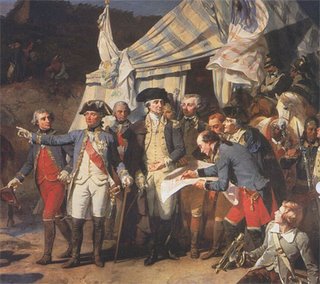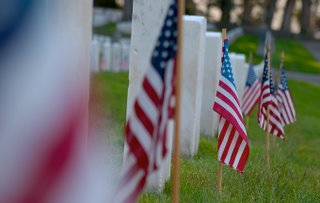
The French have long been the target of American ridicule, even long before Jacques Chirac stiffed us on the Iraq war. There are myriad jokes and one-liners about France and it's lack of, shall we say, battlefield fortitude. Here's an example; Why are the streets of Paris lined with trees? The Germans like to walk in the shade. Or how about this one; Antique French rifle available on eBay. Never fired, only dropped once. These are fun, and deserved to some extent, but we should also remember that without the French the very idea of an independant American nation is very much in question.
This post is actually a paper I wrote on French involvement in the Revolutionary War for a history class at Sonoma State University a couple of years ago. Enjoy.
Why did France enter the American Revolution?
There were essentially three reasons for France’s involvement in the American Revolution: animosity toward England, the ideals of the Enlightenment, and Benjamin Franklin.
France and England had been at odds for generations, going as far back as the Norman invasions of Anglo-Saxon England in the 11th century.
[1] After the Norman victory, complications arose out of the fact that the king of England was also the Duke of Norman, a vassal of the French king. The English monarchy became very strong and far more powerful than the French king who was supposed to be its ruler. Naturally this caused a great deal of friction. The problem came to a head in the 13th century when Philip II, the King of France, was finally able to seize Normandy from England.
[2] The next great conflagration between the two adversaries was the Hundred Years’ War (1337-1453). Sparked by England’s claim to Gascony, the Hundred Years’ War saw the English win many of the early battles, but they did not posses the resources in order to subdue all of France. Eventually, through the exploits of Joan of Arc, the French prevailed and the only English territory left on the continent was the coastal town of Calais.
[3] France and England were not only continental rivals, but competed for colonial power as well. Both countries started to settle North American and Caribbean colonies at about the same time in the mid-seventeenth century. Having the two nations’ colonies, not to mention those of the Dutch, in such close proximity proved to be a source of strife and the late seventeenth and early eighteenth century saw a great deal of conflict both in Europe and abroad. From the treaties following War of Spanish Succession, the War of Jenkins Ear, and the Seven Years’ War (known as the French and Indian War in America) the British were awarded possession of French territories of Nova Scotia, Newfoundland, Canada, Grenada, the Grenadines, and all territory east of the Mississippi. French colonialism in the Americas was all but finished. Britain was now the most powerful and richest nation in the world. Not unlike the present day United States, England was both admired and loathed for its wealth and influence. Though many in the French government and military harbored a great deal of animosity toward England, there were many who shared a different view. As J.J. Jusserand states:
It must not be forgotten that the period of the War of Independence was not
coincident with one of Anglophobia in France, but on the contrary with one of
Anglomania. Everything English was admired, and, when possible, imitated:
manners, literature, philosophy, sport, parliamentary institutions, and above
all, writes one of the earliest French supporters of the colonists, Segur, "the
liberty, at once calm and lofty, enjoyed by the entire body of the citizens of
Great Britain"; Frenchmen "were crazy about the English institutions." It was
the period when people would go to London in order to "learn how to become
thinkers," and to learn also how the stiff rules of old should be discarded,
whether the matter was of the laying out of a garden, of the government of
empires, or the writing of a tragedy. The year of the Proclamation of
Independence was also the one during which the complete works of Shakespeare,
translated by Le Tourneur, took Paris by storm, and were published by
subscription, the King and Queen heading the list. "All the youth of Paris is
for Le Tourneur," wrote indignant Voltaire.[4]
Certainly not all those who admired the “English institutions” were indisposed to seeing it lose it’s colonies, but it seems rather that they harbored a kind of envy and resentment for its success. Undoubtedly, France would make the most of any opportunity to weaken the British Empire and at the same time strengthen its own position on the world stage.
Rivalry with England was unquestionably a large motivating factor, but the timing of the Revolution was particularly good for the colonies. The eighteenth century was a time when thought itself had undergone a revolution. The great writers of the Enlightenment had brought a new consciousness to the mind of the learned Frenchman. As James Breck Perkins stated, “It was the time, as has been said, when a man about to sup suddenly reflected that there were those who had not yet dined.”
[5] Leading the way was John Locke. His exposition of theories on natural law in economics and politics in his Second Treatise had a profound influence on not only the French, but on Americas founding fathers, especially Thomas Jefferson. Locke’s arguments gave legitimacy to the cause of democratic institutions and paved the way for other proponents of natural law in all areas of life. Adam Smith and his Wealth of Nations is still considered to be the definitive work on classic free enterprise economics. Many of these enlightened thinkers were indeed French. Known as the philpsophes they included Voltaire, Diderot, Montesquieu, and Rousseau. Their writings challenged the absolute authority of the monarchy, called for systems of checks and balances, and applied rational thought to everything from art to agriculture. To the common French peasant the goings on in the world of philosophy as it related to world affairs was of little concern. They were much more concerned with scraping together enough food to feed their families. But for the nobility and bourgeois these were the times when enlightened men united to right centuries of wrongs for the good of all humanity. These French saw the American Revolution as the embodiment of these ideals.
While the colonies’ cause itself was seen as the Enlightenment in action, no one man personified the enlightened struggle to the French more than Benjamin Franklin. The moment Franklin stepped off the Reprisal, the ship that brought him across the Atlantic, he was immediately admired. With his marten-fur hat, plain clothes, and spectacles, Franklin was the quintessential frontier philosopher. As Robert Middlekauf said, “The French…wanted a hero, and here in this American genius they found a simple philosopher, a wise and good representative of the best of the American wilderness.”
[6] Even before Franklins arrival there had been French aid to the colonies, due in large part to the influence of playwright Caron de Beaumarchais and Jacques Donatien Leray de Chaumont who became rich from trade in the Ease Indies.
[7] But after the colonists’ defeats at Long Island and Kips Bay, much of the aid was cutoff. Franklins first order of business was to get the aid released from the French harbor, in particular four ships laden with war supplies. Franklin’s methods were calculating and shrewd. By using both the French and English secret services as essentially his message carriers, he was able to secure a quicker commitment from France. As Thomas Fleming explains:
Vergennes (the French foreign minister) might want to keep French aid a secret
because he and his King were not yet sure the Americans were worth a war with
England. But Franklin saw it was to his country’s advantage if the English
knew all about the aid. The more George III found out, the more likely
would be an English declaration of war on France. Who did the declaring
did not matter to Franklin. His mission was to get France into the war on
the American side, the quicker the better.[8]

However, France was reluctant to enter into a military alliance with the colonies. Some within the government, especially minister of finance Baron Anne Robert Jacques Turgot, believed that war with England would be foolish and that Frances real future lay in trade with her traditional rival. He argued that an independent America would be far more economically beneficial to England than to France. Also, France was bound by family ties to the Spanish crown and could not enter into an alliance without first consulting with their Iberian cousins. Events in America soon assisted Franklin in making a breakthrough. Though Philadelphia had fallen, British general Johnny Burgoyne and his army had been defeated at Saratoga by colonial general Horatio Gates, effectively ending the British campaign in the north. Soon after Saratoga the British began making overtures of reconciliation to Franklin. Knowing that he was being watched by both French and English secret services, Franklin masterfully played one side off the other; the English were eager to make peace before the French entered the war and France was eager to deal a blow to British global hegemony before peace could be made between England and it's colony. The ingenious strategy worked and France agreed to a military alliance with the American colonies in 1778. Franklin himself drafted the proposal, which declared that neither the French or the Americans would claim a separate peace with England and that any British-held land conquered by French forces in North America would be ceded to the colonies. A commercial treaty was also signed in which France sought no special considerations for itself. As Franklin put it, France has "taken no advantage of our present difficulties to exact terms which we would not willingly grant when established in prosperity and power."
[9]The American Revolution was an extraordinary event assisted by extraordinary circumstances and extraordinary people. Through an ages old rivalry, the birth of a new intellectual framework, and the uncommon guile of an aging diplomat, an alliance was forged that would change the face of the emerging modern world.
[1] Jackson J. Spielvogel Western Civilization (Third Edition, Volume I) (San Francisco: West Publishing Company, 1997) 324-325.
[2] Jackson J. Spielvogel Western Civilization (Third Edition, Volume I) (San Francisco: West Publishing Company, 1997) 330.
3 Jackson J. Spielvogel Western Civilization (Third Edition, Volume I) (San Francisco: West Publishing Company, 1997) 391.
[4] J.J. Jusserand Introduction James Breck Perkins France in the American Revolution (Boston: Houghton Mifflin Co., 1911) xii.
[5] James Breck Perkins France in the American Revolution (Boston: Houghton Mifflin Co., 1911) 210-211.
[6] Robert Middlekauf The Glorious Cause: The American Revolution, 1763-1789 (New York: Oxford University Press, 1982) 403.
[7]Thomas Fleming Liberty! The American Revolution (New York: Viking Penguin, 1997) 231.
[8] Thomas Fleming Liberty! The American Revolution (New York: Viking Penguin, 1997) 234.
[9] J.J. Jusserand Introduction James Breck Perkins France in the American Revolution (Boston: Houghton Mifflin Co., 1911) x.
Until next time....








